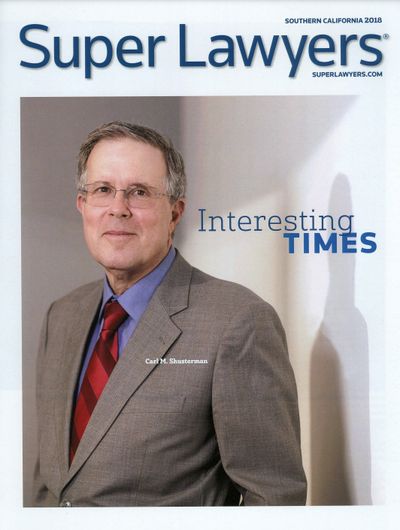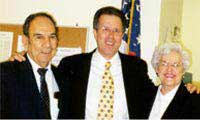
A national interest waiver (NIW) is available to a person seeking a green card who can show the following:
1. That their proposed endeavor has both substantial merit and national importance;
2. That he or she is well positioned to advance the proposed endeavor; and
3. That, on balance, it would be beneficial to the United States to waive the job offer and labor certification requirements.
Normally, if you qualify for a green card under the second employment-based EB-2 category (Persons Holding Advanced Degrees and Persons with Exceptional Ability in the Arts, Sciences and Business), your employer must undergo the PERM labor certification process. This requires the employer to advertise the job and demonstrate to the U.S. Department of Labor that no qualified U.S. workers applied for the job.
However, where your endeavor is deemed to be in the national interest, the USCIS may waive the requirements of a job offer and the PERM labor certification.
On January 21, 2022, USCIS issued a new policy which is intended to make the national interest waiver more broadly available to foreign nationals with STEM backgrounds who are pursuing endeavors that benefit the United States, including entrepreneurial ventures. See additional resources below.
Client Reviews

Highly Competent Legal Services
“I work with Merritt Hawkins, the largest physician search firm in the United States. For over 20 years, we have partnered with The Law Offices of Carl Shusterman, which assists us in obtaining visas for the many international physicians we recruit. Mr. Shusterman and his staff have been an indispensable resource of expertise, allowing us to recruit international doctors in the most efficient manner possible on behalf of our clients.”
- Phil Miller, Merritt Hawkins, Dallas, Texas
Read More Reviews
Zoom Consultations Available!
Though the jobs that qualify for a national interest waiver are not defined by statute, NIWs are usually granted to those who have exceptional ability and whose employment in the United States would greatly benefit the nation. Those seeking an national interest waiver do not need an employer to sponsor them. They may self-petition by filing Form I-140 directly with the USCIS.
In a 2016 decision entitled Matter of Dhanasar, the USCIS held that a national interest waiver petitioner is not required to demonstrate that going through the PERM process would be contrary to the national interest.
Previously, the government had restricted the use of NIWs by ruling that an applicant could only qualify for a national interview waiver if it could be demonstrated that it would be contrary to the national interest to require him to undergo the PERM labor certification process.
National Interest Waiver – Overview of the 3 Prongs
The Proposed Endeavor has both Substantial Merit and National Importance
When reviewing the proposed endeavor, officers determine whether the evidence presented demonstrates, by a preponderance of the evidence, the proposed endeavor has substantial merit and national importance.
The term “endeavor” is more specific than the general occupation; a petitioner should offer details not only as to what the occupation normally involves, but what types of work the person proposes to undertake specifically within that occupation.For example, while engineering is an occupation, the explanation of the proposed endeavor should describe the specific projects and goals, or the areas of engineering in which the person will work, rather than simply listing the duties and responsibilities of an engineer.
The endeavor’s merit may be demonstrated in areas including, but not limited to, business, entrepreneurship, science, technology, culture, health, or education.In addition, officers may consider evidence of the endeavor’s potential significant economic impact, but “merit may be established without immediate or quantifiable economic impact” and “endeavors related to research, pure science, and the furtherance of human knowledge may qualify, whether or not the potential accomplishments in those fields are likely to translate into economic benefits for the United States.”
Officers must also examine the national importance of the specific endeavor proposed by considering its potential prospective impact. Officers should focus on the nature of the proposed endeavor, rather than only the geographic breadth of the endeavor.
For example, the endeavor “may have national importance because it has national or even global implications within a particular field, such as certain improved manufacturing processes or medical advances.” Economically, it may have “significant potential to employ U.S. workers” or “other substantial positive economic effects, particularly in an economically depressed area.”
Therefore, petitioners should submit a detailed description explaining the proposed endeavor and supporting documentary evidence to establish that the endeavor is of national importance.
In determining national importance, the officer’s analysis should focus on what the beneficiary will be doing rather than the specific occupational classification. Endeavors such as classroom teaching, for example, without broader implications for a field or region, generally do not rise to the level of having national importance for the purpose of establishing eligibility for a national interest waiver.
Ultimately, if the evidence of record demonstrates that the person’s proposed endeavor has the significant potential to broadly enhance societal welfare or cultural or artistic enrichment, or to contribute to the advancement of a valuable technology or field of study, it may rise to the level of national importance.
The Person is Well Positioned to Advance the Proposed Endeavor
In evaluating whether the person is well positioned to advance the endeavor, USCIS considers factors including, but not limited to:
* The person’s education, skills, knowledge, and record of success in related or similar efforts;
* A model or plan that the person developed, or played a significant role in developing, for future activities related to the proposed endeavor;
* Any progress towards achieving the proposed endeavor; and
* The interest or support garnered by the person from potential customers, users, investors, or other relevant entities or persons.
Evidence that may demonstrate that the person is well-positioned to advance a proposed endeavor includes, but is not limited to:
* Degrees, certificates, or licenses in the field;
* Patents, trademarks, or copyrights developed by the person;
* Letters from experts in the person’s field, describing the person’s past achievements and providing specific examples of how the person is well positioned to advance the person’s endeavor;
* Published articles or media reports about the person’s achievements or current work;
* Documentation demonstrating a strong citation history of the person’s work or excerpts of published articles showing positive discourse around, or adoption of, the person’s work;
* Evidence that the person’s work has influenced the field of endeavor;
* A plan describing how the person intends to continue the proposed work in the United States;
* A detailed business plan or other description, along with any relevant supporting evidence, when appropriate;
* Correspondence from prospective or potential employers, clients, or customers;
* Documentation reflecting feasible plans for financial support (see below for a more detailed discussion of evidence related to financing for entrepreneurs);[54]
* Evidence that the person has received investment from U.S. investors, such as venture capital firms, angel investors, or start-up accelerators, and that the amounts are appropriate to the relevant endeavor;
* Copies of contracts, agreements, or licenses showing the potential impact of the proposed endeavor;
* Letters from government agencies or quasi-governmental entities in the United States demonstrating that the person is well positioned to advance the proposed endeavor (see below for a more detailed discussion of supporting evidence from interested government agencies and quasi-governmental entities);
* Evidence that the person has received awards or grants or other indications of relevant non-monetary support (for example, using facilities free of charge) from federal, state, or local government entities with expertise in economic development, research and development, or job creation; and
* Evidence demonstrating how the person’s work is being used by others, such as, but not limited to:
* Contracts with companies using products that the person developed or assisted in developing;
* Documents showing technology that the person invented, or contributed to inventing, and how others use that technology; and
* Patents or licenses for innovations the person developed with documentation showing why the patent or license is significant to the field.
On balance, it would be beneficial to the United States to waive the job offer and thus the permanent labor certification requirements
Petitioners may submit evidence relating to one or more of the following factors, as outlined in Matter of Dhanasar:
* The impracticality of a labor certification application;
* The benefit to the United States from the prospective noncitizen’s contributions, even if other U.S. workers were also available; and
* The national interest in the person’s contributions is sufficiently urgent, such as U.S. competitiveness in STEM fields.
More specific considerations may include:
* Whether urgency, such as public health or safety, warrants foregoing the labor certification process;
* Whether the labor certification process may prevent an employer from hiring a person with unique knowledge or skills exceeding the minimum requirements standard for that occupation, which cannot be appropriately captured by the labor certification;
* Whether the person’s endeavor has the potential to generate considerable revenue consistent, for example, with economic revitalization; and
* Whether the person’s endeavor may lead to potential job creation.
Exception: National Interest Waiver for Physicians
Congress passed a law which eased the national interest waiver process for physicians who practice in medically-underserved areas or for the Veterans Administration. However, the INS issued regulations which effectively cancelled many important portions of the law.
Our law firm sued the INS in Federal Court, and in 2006, the U.S. Court of Appeals for the Ninth Circuit, in Schneider v. Chertoff, ruled in our favor. Since then, it has become much easier for a physician to qualify for a green card through a national interest waiver.
A physician must work for a minimum of 5 years in either a Health Professional Shortage Area (HPSA), Medically Underserved Area (MUA) or for the Veteran’s Administration (VA) in order qualify for a green card through a national interest waiver.
Contrary to the former INS regulation, all physicians are eligible for NIWs, primary care doctors and specialists alike. Also contrary to the previous INS regulation, the 5 year period starts not when the I-140 is approved, but as soon as the physician starts working in the HPSA, MUA or for the VA. The physician is permitted to change employers or job locations after he/she has fulfilled the 3-years requirement for a J waiver.
National Interest Waiver – Success Stories

- Helping a Person Qualify for a National Interest Waiver
- Keeping an National Interest Waiver from Being Revoked
- Professional Athlete – “Curveball: The Immigration Officer Who Knew Too Much”
- Engineers and Nurses
National Interest Waiver – Additional Resources
- USCIS Updates Guidance on EB-2 National Interest Waiver Petitions (1-15-25)
- O-1A Visas, National Interest Waivers Rise After Immigration Guidance (7-30-24)
- USCIS to Implement Premium Processing for Certain Previously Filed EB-1 and EB-2 Form I-140 Petitions (5-24-22)
- USCIS Updates Guidance on National Interest Waivers (1-21-22)
- USCIS Policy Manual – Chapter 5 – Advanced Degree or Exceptional Ability
- How to Make an Expedite Request (USCIS)
- AAO Non-Precedent Decisions for Advanced Degree, Exceptional Ability, National Interest Waiver
- National Interest Waiver for a Physician








